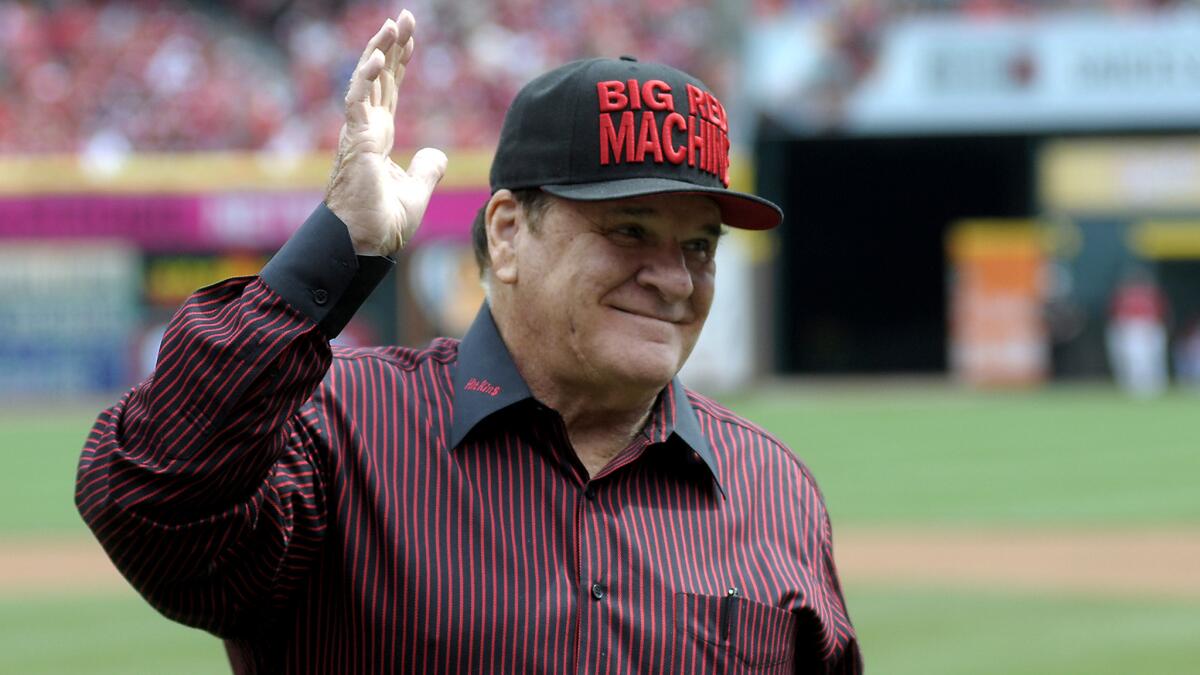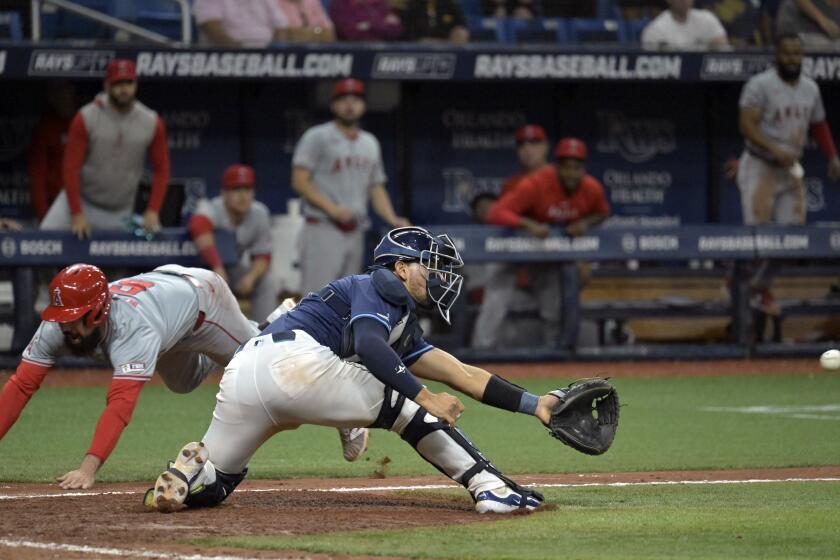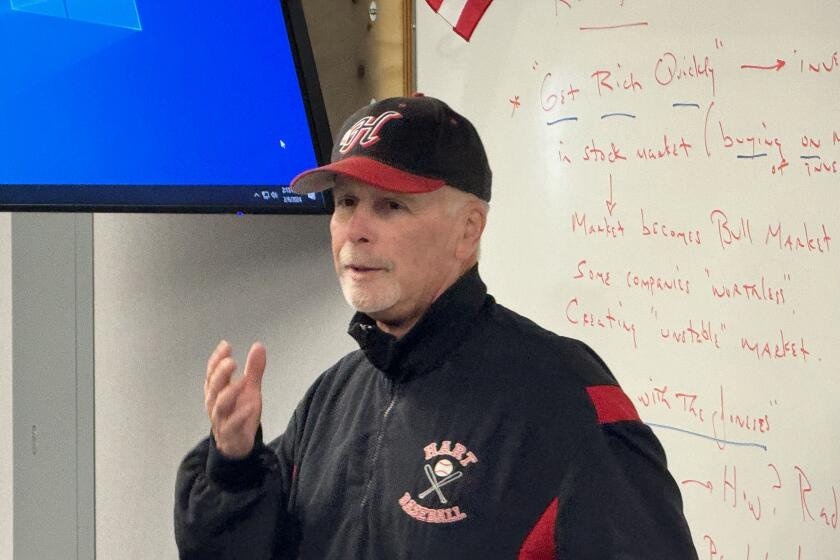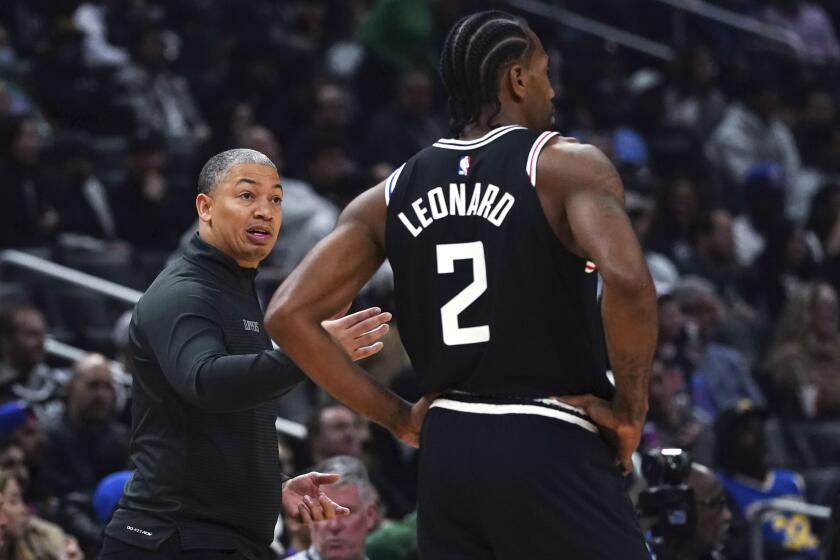Don’t bet on Pete Rose getting into Hall of Fame

Pete Rose acknowledges the fans during a ceremony at Great American Ball Park in Cincinnati on Sept. 12.
Pete Rose is 74. He is too old to manage a team, even with baseball’s blessing, too long removed from a rapidly evolving game. And, if the Cincinnati Reds would like him to entertain potential ticket buyers or headline a fantasy camp, who cares?
On Friday, after the announcement that Rose had made his case for reinstatement in a meeting with Commissioner Rob Manfred, the urgency surrounded only one question: Could baseball’s all-time hits leader be heading toward induction in the Hall of Fame?
Don’t bet on it.
First, a tip of the cap to Manfred, who promised to make a decision within three months. Manfred’s predecessor, Bud Selig, met with Rose in 2002, then left him in limbo for 13 years. Closure, for Rose and for all of us.
In 1989, Rose was banished for life, after an exhaustive report concluded he gambled on baseball. In his meeting last week, Manfred afforded Rose the opportunity to present any new evidence that might prompt the commissioner to reconsider the lifetime ban.
However, Rose’s credibility has been damaged since 1989. He insisted he did not bet on baseball as a manager, then acknowledged he did, as detailed in baseball’s investigative report. He then insisted he did not bet on baseball as a player, then ESPN uncovered documents this year that showed he did.
Manfred has no authority to keep Rose out of the Hall of Fame. However, the Hall of Fame declared in 1991 that any person on the banned list could not be inducted.
If Manfred were to lift the ban, in full or with restrictions, Rose could be considered for the Hall by an expansion-era veterans’ committee, made up of Hall of Fame members, executives, and media members.
Hall of Fame members toe a particularly hard line, and it is difficult to imagine how they would look favorably on Rose, who shows up regularly in Cooperstown, N.Y., for induction weekend, selling autographs and stealing at least part of the show.
Dodgers Hall of Fame manager Tom Lasorda, who served on the last such committee in 2013, told The Times in July: “If you are stupid enough to go out and bet on your own team and bet on baseball, there has got to be something wrong.”
Picking up the pace
Scott Schebler had barely rejoined the Dodgers this month when he got a letter from the league office, warning him that he could be fined if he kept stepping out of the batter’s box while batting.
MLB had threatened to fine players, after an April grace period, for violating new rules designed to keep the game moving. But players have responded so cooperatively that officials have only levied about a dozen fines, and the average time of game has fallen from 3 hours 2 minutes last season to 2:56 this season, through Wednesday.
The next frontier could be the pitch clock, implemented at the triple-A and double-A levels this season. Pitchers had 20 seconds to deliver the ball, and batters had to be ready. The International League cut 16 minutes from its average game time the Pacific Coast League cut 13 minutes.
The players’ union would have to approve any pitch clock in the major leagues. Schebler and three teammates that played at triple A this season each said the pitch clock worked well at that level — training players not to dally — but probably would not be feasible in the majors.
“You’re not going to have Albert [Pujols] stay in the box the whole time,” Schebler said. “He’s got his routine. He’s hit 500 home runs. You’re not going to change that. It’s for the fans. I don’t think you’re going to change a superstar.”
In the minors, umpires called a strike, even a third strike, on players that did not get into the batter’s box on time. Joe Wieland said he could not imagine that happening to, say, Adrian Gonzalez, in the ninth inning of a tie score.
“You can’t tell me that in a World Series or a playoff game, that you’ve only got 20 seconds to figure out what you want to do,” Wieland said. “Runner at third, tying run or winning run, the pitch clock is counting down, and you’re telling me I’m going to have to go? I can’t take my time? I just don’t think that, at this level, will happen.”
Said Austin Barnes: “There’s a lot of money to be made up here. I don’t know how it would go.”
Mike Bolsinger said the use of a pitch clock might not be the easiest way to shave a few minutes from each game.
“You’ve got instant replay,” Bolsinger said. “People talk about quickening the game up, and everybody out there is waiting five minutes for a simple call that you could see on the big ‘tron. It’s clear as day, but it takes five minutes in New York.”
The average time from challenge to ruling this year is 1 minute 52 seconds, up six seconds from last year, according to MLB.
No deal, no dollars
This September marks the two-year anniversary of the Anaheim City Council voting to approve the framework of an agreement that would have kept the Angels playing at Angel Stadium through 2036.
Under the deal, the Angels would have renovated the stadium, recouping their costs by developing the surrounding land. The city would have paid nothing to renovate the stadium and nothing to develop the land, and the Angels might have had to spend $500 million to get any return.
Mayor Tom Tait objected, arguing the city should get more than $1 per year in rent for the land and should share equally in profits from development. The other four members of the council supported the framework but declined to call for a second vote that would have clinched the deal.
Renewed negotiations ensued, then stalled, and Angels owner Arte Moreno walked away from the deal a year ago. He has declined the city’s invitation to revive discussions.
The Angels’ three-year window to opt out of their stadium lease opens next year.
The land remains undeveloped. The city’s share of development profits and tax revenues from that land for the last two years, and for the foreseeable future, remains what it has been since Angel Stadium opened in 1966: zero.
Voices of Cooperstown
Dick Enberg was the finest broadcaster in Angels history, and his combination of versatility and excellence is perhaps unmatched in history of sports broadcasting. He was inducted into the Hall of Fame in July, an appropriate crown to a distinguished career.
Enberg, 80, announced last week that next season would be his last as television voice of the San Diego Padres. Congratulations, yes, but Padres Chief Executive Mike Dee got a little carried away in his statement.
“Inarguably, Dick is the greatest storyteller the sports world has ever known,” Dee said.
Inarguably? The Padres finish their season at Dodger Stadium next weekend. Here’s hoping someone introduces Dee to Vin Scully.
More to Read
Get our high school sports newsletter
Prep Rally is devoted to the SoCal high school sports experience, bringing you scores, stories and a behind-the-scenes look at what makes prep sports so popular.
You may occasionally receive promotional content from the Los Angeles Times.







